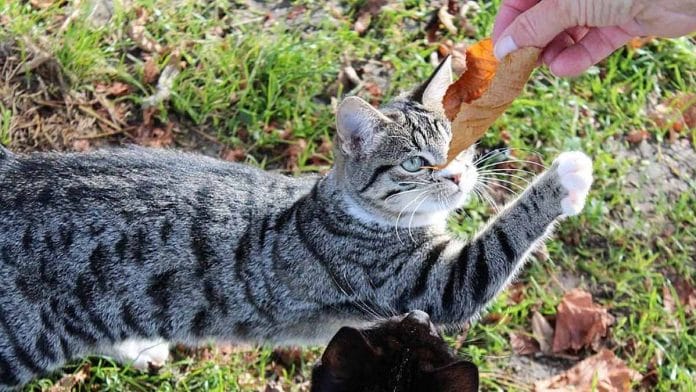New Delhi: Not mice or poor animal control practices, but women could be the real reason behind the overburdening population of stray cats in parts of China, or so suggest five researchers at Nanjing University.
The findings, however, led to accusations of the study being “discriminatory”, resulting in it being pulled down Friday.
“We found that the population density of free-ranging cats is linearly related to the proportion of female students in the university,” reads the abstract of the study ‘Where there are girls, there are cats’, which was published by the Biological Conservation.
“Are they suggesting controlling the density of human females as a strategy for managing free ranging (cat icon)?” asked one Twitter user.
Are they suggesting controlling the density of human females as a strategy for managing free ranging ??
Or targeting “keep your ? indoors” education campaigns to women? I won’t know because I have better things to do than read this paper. But hopefully it’s the latter ??♀️.
— Dr. Stephanie Avery-Gomm (@saverygo) February 11, 2020
In an email conversation with ThePrint, researcher Zhongqiu Li defended the study and said they were only hoping to “show a phenomenon”. The other researchers are Yuhang Li, Yue Wan, Yigui Zhang and Zhaomei Gong.
Why the controversy
The study begins by outlining the problem: The threat an increase in the population of feral cats poses.
“Extensive evidence suggests that free-ranging cats caused numerous localised population declines and extirpations (local extinction) of prey species,” reads the introduction.
The study then highlights that the “the proportion of human females may affect the cat population in a certain area”.
The researchers hypothesised that cat density could be negatively related to human sex ratio (human male/human female) i.e. the higher the number of cats, the more skewed the sex ratio is towards the females. It noted that human females are more concerned with stray cats and have a “higher tendency to feed them than human males”. It also said cats react “more positively to human females than human males”.
Science behind the study
In order to test out the three hypotheses, the researchers employed data analysis, questionnaires and “socialisation” tests. For the first test, the researchers studied the likely correlation between the population of stray cats and the population of human females across 30 universities in Nanjing.
“The density of cats was significantly correlated with the proportion of female students,” the researchers deduced through this method.
The researchers then tried to explain why the correlation exists and what the “human female effect” could possibly be. “The 2038 online questionnaires showed that more females had fed or rescued outdoor free-ranging cats than males,” the study said.
Socialisation tests were also conducted wherein 16 experimenters (9 males and 7 females) walked around the university campus to study a host of behaviours of 27 cats, including purring. “Our socialisation index test shows that cats may potentially distinguish human males from human females,” the researchers noted.
The study eventually attempts to answer the question — are cats attracting human females or are human females attracting cats?
Also read: Here’s how to pet your cat, according to science
‘Study was misunderstood’
The researchers denied that the content of their study is sexist and said they’ve been studying the negative impact of feral cats and dogs on wildlife since 2016.
“We just want to know how many cats and how many wildlife killed by cats in China, and how to manage the free-ranging cat population,” Zhongqiu Li, who is also an associate professor at Nanjing University, told ThePrint over email.
Li added that Twitter users might have misunderstood their paper. “What we are saying in this paper is just the free feeding behaviour from females, of course sometimes males, may result in the increase of free ranging cats, and what we suggest is just to show more about the cat impact on wildlife to females (sic),” he said.
On the peer review platform Pubpeer, Li said perhaps their expression in English or cultural difference was why the study was being heavily criticised. “In Chinese, it is very easy to understand and accept. I really don’t understand why human sex cannot be discussed in a paper,” he wrote.
Also read: Pet owners value dogs over cats & it’s all about wanting to be masters







There are some guys who’ll understandably hesitate at speaking in public about their particular fondness for pet felines; for, to do so, unlike with expressing affection for a good sturdy canine friend, may be generally stereotyped as a man’s non-testosterone pet-animal inclination. And, yes, there are many people out there who’d implicitly or explicitly question the normality altogether of a guy who adores his pet feline(s)—something that’s implied by first-season Seinfeld’s George Costanza, who, in a doubtful tone of voice and slight shake of his head, says to Elaine Benes (without looking at her) in regards to her boyfriend cherishing his two pet felines: “Guys with cats … I don’t know …”
George’s line rushed to mind after one particular response I received upon posting a short essay onto a feline-fan site (accompanied by an adorable feline photo, of course); it was from a reader subtly questioning my ‘normality’, which left me feeling both embarrassed and angry.
I further recollected how as a teen I knew two of the (if not the most) toughest, testosterone-laden, and (like myself) straight guys around, who also cherished their pet cats—albeit, no average guy would’ve foolishly openly expressed his pet-feline enthusiasm amongst his demographic peers, lest he seriously risk being unjustly deemed a wuss or in some other way having his reputation permanently besmirched.